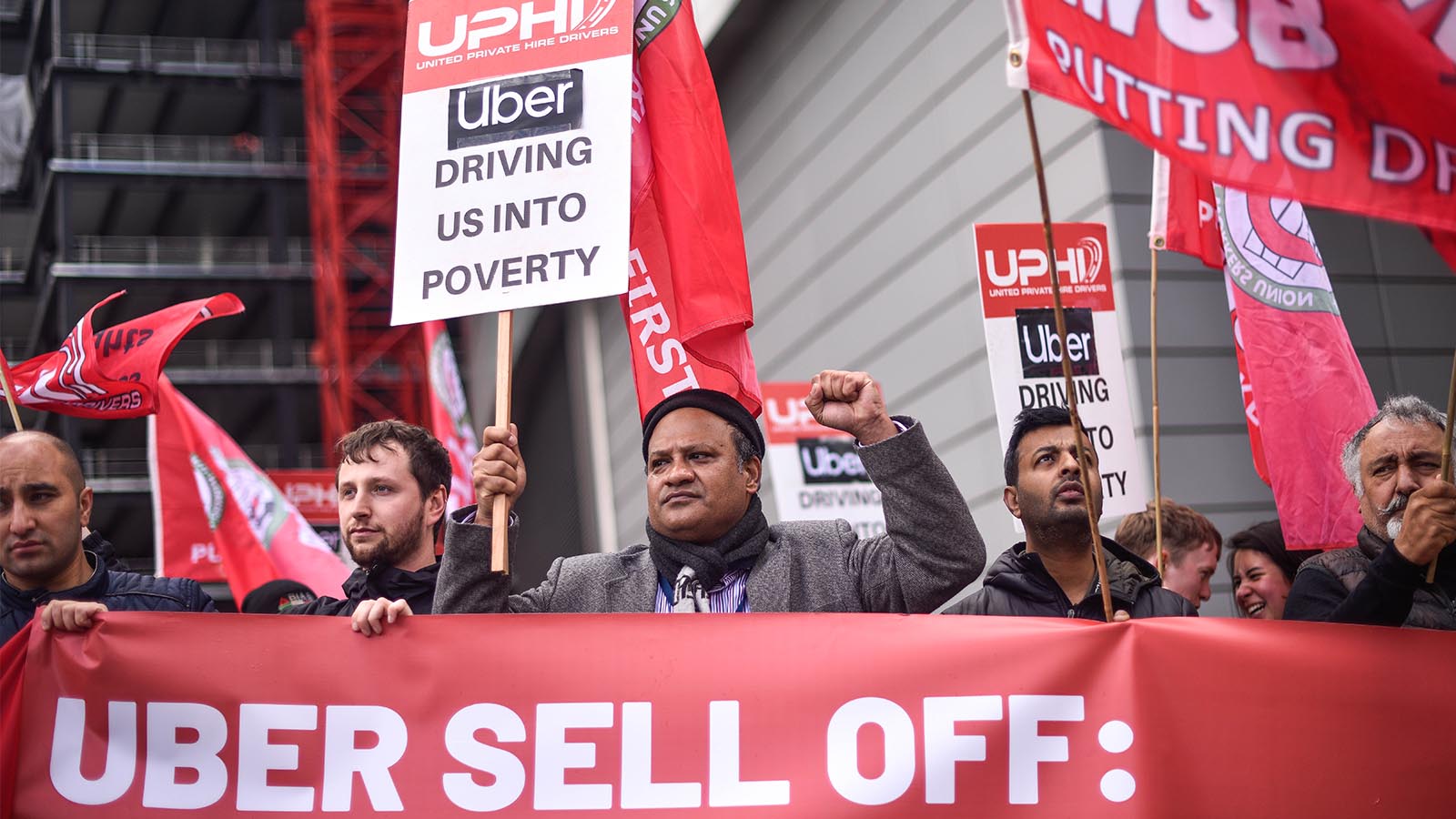
When Uber went public on May 10, 2009, the hype surrounding the company’s IPO launch was deafening. The unstoppable tech-startup, valued at $82 billion, was being called the next Facebook. Since 2009, Uber has entered 63 countries and now serves an estimated 110 million users worldwide. So why the debacle surrounding its operations in Israel?

Uber’s entry into the Israeli market has been riddled with difficulties since the beginning. Uber first came on the scene in Israel in 2014, offering a service which allowed individuals to order rides from already licensed taxis. When the company piloted a version of its trademark ride-sharing service in Tel Aviv in 2017, the Tel Aviv District Court ruled it illegal in under a month, on account of non-existent insurance regulations for this kind of ride-sharing.
Uber’s operations have since remained restricted to connecting users to registered taxis. Meanwhile, Uber is waging an all-out war on Israeli lawmakers and regulators in an effort to legalize its ride-sharing service, which represents the lion’s share of its business strategy worldwide.

Taxi drivers fear that deregulation and the introduction of gig economy employment practices will harm the Israeli taxi sector and have been protesting Uber's attempts to gain access to Israel. While PM Benjamin Netanyahu's support of Uber is well-known, former Minister of Transport Israel Katz backed the taxi drivers' opposition. But since Betzalel Smotrich took office as the new Minister of Transport in 2019, many taxi drivers fear that the door to Uber's ride-sharing services may be open.
The road to deregulation
If Uber’s ride-sharing service is to be given the green light in Israel, it must overcome two legal obstacles. First, it must change Israeli insurance law to explicate proper accountability for this kind of ride-sharing service, which is currently undefined under Israeli law. This idea seems to have gained support with top officials in recent years, with Moshe Bareket, head of the Insurance Supervision Authority, saying that “As far as I see it, there is no problem insuring this service – it’s exactly like taxis.”
But Uber's second, and larger, legal challenge is to achieve a sweeping deregulation of the taxi industry. Today, all Israeli taxi drivers have to be authorized and strictly regulated by the Ministry of Transport. If Uber is to be allowed to offer ride-sharing services in Israel, regulations must be changed to allow any driver to act as a taxi driver, without government supervision. This has been one of Uber's main goals in Israel, but has met with staunch opposition in the Ministry of Transport.

As part of a coordinated effort to garner support for deregulation, a conference entitled “Beating Traffic,” was held last month in Tel Aviv. The conference was attended by private companies as well as senior government officials and public figures in transportation, insurance and finance. Notably, the conference was sponsored by Future Mobility, a venture which claims to have been founded “to serve the public,” but has been criticized as being a lobby group masquerading as a public interest group and is largely funded by a variety of private transportation companies, including those who directly or indirectly profit from private car sales.

During the conference, Uri Yogev, founder of Future Mobility, asked Michal Halperin, chair of the Israel Competition Authority: “How can you help us order an Uber or a Lyft any time soon?” She responded by saying, “By persuading regulators that we can increase competition, remove barriers – for years we’ve been working on a shared transportation project at the Competition Authority.” The Ministry of Transport is the regulator that determines who is legally permitted to offer paid transportation services. Nonetheless, Halperin expressed her disapproval regarding the ministry’s current position: “It’s the Ministry of Transport’s responsibility to serve the public’s best interest, so they need to be on board with opening up the market to more possibilities.”
Who stands to benefit from deregulation?
However, Halperin’s conclusions about the Israeli taxi industry are at odds with the reality on the ground. Competition has always existed in the industry, between a multitude of taxi drivers and private transportation companies. A more accurate assessment of the taxi industry would conclude that it does not suffer from a lack of competition, but rather, it is subject to regulation – which Halperin wishes to dismantle. In fact, while on the surface, Uber might appear to be a natural competitor to taxis, there is one key difference – taxis are licensed to accrue a fee, and private cars are not. Uber’s full entry demands deregulation: a dismantling of the way in which the state has defined the legal requirements for entering the industry.
My job is not to worry about foreign tycoons, but to serve Israeli citizens
Taxi regulations in Israel are relatively soft in comparison to other countries, insofar as there is no hard limit placed on the number of taxis allowed on Israeli roads. The entry barrier in Israel is purely financial – the price of a taxi license, better known as the green number plate. In many other countries, however, such as the United States, a taxi license is gained through the acquisition of one of a limited number of special medallions.
Israel’s previous Transport Minister, Israel Katz, was steadfastly opposed to deregulating the taxi industry. After Prime Minister Benjamin Netanyahu met with Uber co-founder Travis Kalanick in 2016, he entreated Katz to lift the regulations limiting Uber in Israel. The ex-Transport Minister, however, resolutely refused: “My job is not to worry about foreign tycoons, but to serve Israeli citizens.”

The current Transport Minister, Bezalel Smotrich, on the other hand, has not expressed any opposition to Uber, and amid increased support on the part of numerous government officials, such as Uri Maklev, former chair of the Knesset’s Science and Technology Committee, Uber’s chances of being granted unrestricted access to Israel’s roads are arguably higher than ever before. Despite this, opposition from the Taxi Driver’s Association among other dissenting voices maintain that Uber’s ride-sharing is harmful to the Israeli public.
At the heart of the argument lies a disagreement about how best to service a nation’s transportation needs. Uber’s proponents argue that regulation unnecessarily drives prices up, and that the ride-sharing service would benefit consumers by facilitating rides whose prices perfectly reflected the laws of supply and demand via the application's algorithm. They claim that this would lead to higher availability of rides at remote locations and non-peak times, which are currently underserviced by taxis. While this would indeed be a real benefit for the rider, this dynamic begs the question – how can Uber afford to be so cheap and available?
A glance at Uber’s financial reports reveals the truth: they can’t. Uber is losing billions of dollars every year and is unable to keep up with the costs of running services. Even more alarmingly, there is no clear path forward if the company is to recover. They cannot cut costs by paying drivers less, because they already pay their drivers the absolute minimum, with Uber drivers all over the world protesting their effectively exploitative wages if fuel, running costs and car depreciation are taken into account. Uber also cannot turn a profit by raising prices, because it would rapidly lose its client base. Uber competes with many ride-sharing companies everywhere it operates who regularly operate at a loss, forcing each other to offer lower and lower prices. The strategy is to financially outlast the opposition, by forcing them to either go bankrupt or leave the market, at which point the victor is rewarded with a monopoly, over which they can eventually raise prices and make a profit. The problem is that as quickly as ride-sharing companies disappear, new ones appear, resulting in a never-ending race to the bottom, and no profits in sight. This leaves companies like Uber reliant on a constant stream from foreign investors' dollars and on government assistance.

To make matters worse, it is common for Uber drivers to be in debt to the company for which they work – stuck paying back high-interest loans taken out on new cars they purchased in hopes of making a reliable income. Such ride-sharing cars, once on the road, do not carry a single passenger between 54-to-62 percent of the time they are operational, according to a study conducted by Uber and Lyft. Uber’s business model – while providing increased ride availability – clogs public roads with empty cars, causing increased traffic. What's more, Uber’s low pricing has not been effective among car owners, who might have forgone driving in favor of a ride, but has overwhelmingly attracted those who regularly rely on public transportation. In other words, Uber contributes to traffic in another way, by incentivizing the public to use less public transport and travel more in Uber cars.
In response to these criticisms, Future Mobility responded to Davar with their own plan for getting the best of both worlds in Israel – which includes introducing a 3 shekel tax per passenger on all rides, aimed at dissuading public transport users from heavy Uber use. According to their analysis, this would mitigate concerns of increased traffic while providing the Israeli public with a cheap, highly available ride-sharing alternative. As for what the government will decide, the jury is still out.






